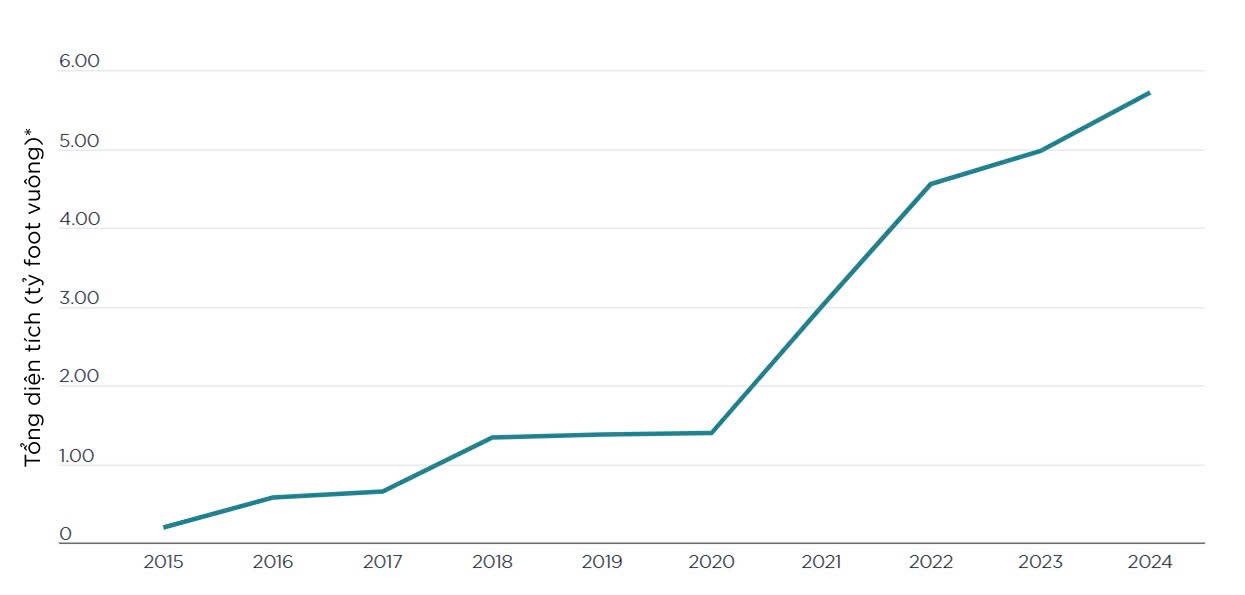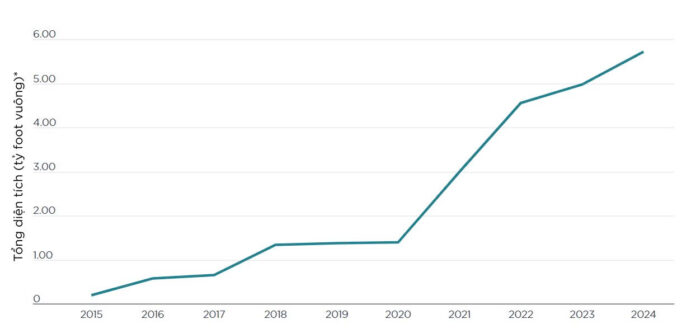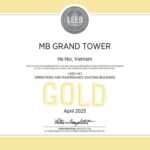According to Savills Vietnam, the office market in Vietnam remains stable, with a total supply of 2.33 million m2 in Hanoi and 2.8 million m2 in Ho Chi Minh City. However, behind these figures lies a profound transformation driven by new generations of workers, industry differences, and entirely new expectations of the workplace.
The Savills Impacts report indicates that by 2034, Millennials, Gen Z, and Gen Alpha will comprise approximately 80% of the workforce in developed economies. This growing influx of young employees is putting pressure on employers to restructure workspaces. They prioritize values such as health, community, mental well-being, and flexibility. Offices need to actively support these needs.
In Vietnam, this trend is evident through the increasing demand for high-quality office buildings with open designs, natural lighting, ergonomic furniture, and supportive work-life amenities.
Ms. Lai Thi Nhu Quynh, Deputy Director of Savills Ho Chi Minh City’s Commercial Leasing department, stated that the previous pandemic had already catalyzed a noticeable shift in work environments, forcing businesses to adapt and re-evaluate the purpose of efficient offices. Nowadays, with the entry of this younger workforce, the hybrid work model has become the norm. Consequently, offices are not just places of work but also hubs for collaboration, innovation, and talent attraction and retention.
According to Savills, sustainability trends are increasingly influencing office rental decisions, especially among multinational corporations, which accounted for 82% of new leases in Ho Chi Minh City in Q1/2025.
In the Asia-Pacific region, there is a rapid increase in interest in green standards, leading to a “green premium”—a rental differential between certified green buildings and conventional projects, averaging 10%. Certifications such as WELL, LEED, BREEAM, or Green Mark are not just image-building tools but also reflect businesses’ net-zero emissions commitments.
In Vietnam, while these standards are still in their early adoption phase, the trend is clear, especially in new buildings targeting international tenants. Notably, in Ho Chi Minh City during the first quarter, foreign enterprises remained the dominant force in the Vietnamese market, accounting for 82% of new leases.

Total area of real estate registered for the WELL program(s) (in sq. ft.). Source: Savills Research, using data from the International WELL Building Institute.
Another notable trend is tenants’ increasing demand for premium offices that cater to spiritual and physical well-being. Instead of solely focusing on space or location, businesses now seek versatile, comfortable spaces with unique identities that can support their internal cultural development goals.
In the Asia-Pacific region, particularly in Vietnam, there is a growing trend of constructing “work-resort” style offices equipped with amenities such as gyms, nursing rooms for new mothers, relaxation areas, and various other supportive facilities. In Ho Chi Minh City, the average rent has increased to VND 833,000/m2/month (up 2% quarterly and 4% annually), indicating tenants’ willingness to pay a premium for superior offerings.
Data from Savills Vietnam in Q1/2025 revealed that the ICT sector led office leasing demand in Ho Chi Minh City, accounting for 35% of new leases. This was followed by the FIRE sector (14%), manufacturing (13%), and consulting (10%).
Interestingly, Gen Z, the emerging workforce, tends to spend more time in the office than previous generations, with a difference of up to 12%. For this generation, on-the-job learning opportunities, connections, and direct mentorship are essential for career development.
However, this does not equate to inefficient use of space. On the contrary, a trend of “office peak hours” is emerging. Tuesdays to Thursdays are the days with higher occupancy rates, while Mondays and Fridays tend to be quieter. This dynamic compels businesses and investors to redesign offices with flexibility, from arranging group workspaces to adjusting operations during peak and off-peak hours.
According to Savills, another significant change is the shift in the relationship between investors and tenants. Whereas office leasing used to be primarily transactional, the two parties are now moving towards a more strategic and sustainable collaborative model. Tenants’ demands are increasingly focused on service quality, experience, and flexibility rather than pure space.
Investors are quickly adapting—from relaxing contract terms and enhancing amenities to developing value-added services to retain clients long-term.
“In today’s multi-generational workforce and the rapidly changing landscape of the Fourth Industrial Revolution, understanding, adapting to, and effectively leveraging these new trends in the workplace are key to commercial real estate investors and businesses maintaining their competitive edge and achieving sustainable growth,” emphasized Savills’ representative.
The Ancient Heritage Tree: A Natural Bonsai Masterpiece
With its unique form and exceptional cultural and environmental value, the nghê an [please clarify this term or provide a definition for it] tree has been bestowed the honor of becoming a Vietnamese Heritage Tree. This recognition celebrates the tree’s singular beauty and its deep significance to the local community, whose pride in this natural wonder is palpable.
Celebrating 30 Years of Decathlon in Vietnam: Inspiring a Nation of Sports Enthusiasts
On June 12, 2025, Decathlon, the world’s leading sports retailer, celebrated its 30th anniversary in Vietnam. This milestone marks a steadfast journey of bringing sports closer to the people across the country.





















